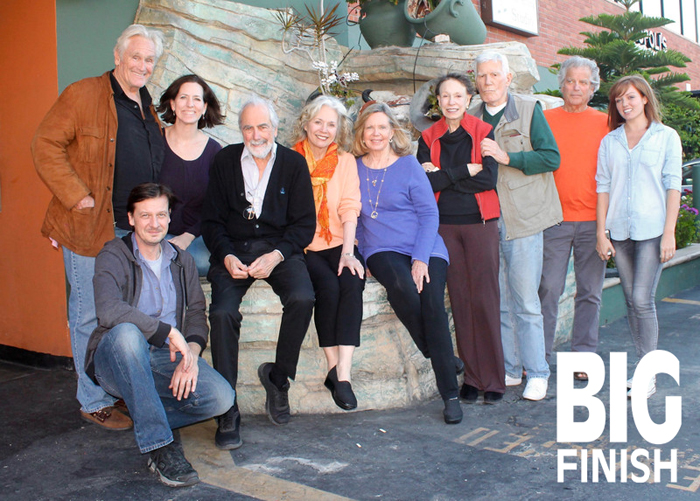By WALLACE McBRIDE
There's a careful reverence to DARK SHADOWS: BLOOD & FIRE that falls somewhere on the spectrum between alchemy and magic. Designed to commemorate the 50th anniversary of the original series, BLOOD & FIRE isn't the result of rushing a product to the marketplace in order to hit some arbitrary date on a calendar. There's genuine love and affection on display here, plus a superstitious attention to detail that is almost frightening. There are so many layers to BLOOD & FIRE that we might be discussing this story for years to come.
It's so packed with substance that, a few paragraphs into writing this, I've surrendered any pretense to trying to discuss them all. BLOOD & FIRE is a thematic pageantry of all things DARK SHADOWS, and you'll find just about everything that's ever been associated with the series buried within its text. There are references to "Collins House," the pre-production name for Collinwood that managed to slip into Marilyn Ross tie-in novels; the presence of one of the leads from the 1991 DARK SHADOWS "revival" series; and an appearance by a member of the ne'er–do–well Cunningham family from the more recent Big Finish audios. The decision to incorporate elements tangential to the original series reminded me of this Old English rhyme:
"Something old,This is the sentiment that drives BLOOD & FIRE, and one that becomes all the more relevant when you consider that the story, like the rhyme, is about a wedding.
something new,
something borrowed,
something blue,
and a silver sixpence in her shoe."
 As with Big Finish's BLOODLUST serial, BLOOD & FIRE takes the storyline back to its soapy roots. It's broken into four episodes which spend in inordinate amount of time dwelling on backroom skulduggery. On the main stage is the pending wedding of Joshua Collins (Andrew Collins, doing a swell impression of Louis Edmonds) and Laura Murdoch Stockbridge (Joanna Going.) On the way to Collinsport, Laura's carriage picks up a stranded traveler, Cassandra Peterson (Lara Parker), who offers a backstory to explain her predicament that makes little sense and puts a few people on guard.
As with Big Finish's BLOODLUST serial, BLOOD & FIRE takes the storyline back to its soapy roots. It's broken into four episodes which spend in inordinate amount of time dwelling on backroom skulduggery. On the main stage is the pending wedding of Joshua Collins (Andrew Collins, doing a swell impression of Louis Edmonds) and Laura Murdoch Stockbridge (Joanna Going.) On the way to Collinsport, Laura's carriage picks up a stranded traveler, Cassandra Peterson (Lara Parker), who offers a backstory to explain her predicament that makes little sense and puts a few people on guard.That's because Cassandra is Angelique Bouchard, dropped into the distant past by a demon with plans to destroy the Collins family TERMINATOR-like before they can gain a toehold on history. In that regard, BLOOD & FIRE makes about as much sense as any story involving time travel ... which isn't much. Seeing as how DARK SHADOWS has a long, proud history of bullshit time travel paradoxes, though, these logical inconsistencies feel right at home.
Once at Anchor House (the home of the Collins family in 1767) the writer's time zone begins to shine through. American soaps are notoriously trashy. Even when DARK SHADOWS debuted in 1966, the story lines could be a bit coarse. Soaps were created for an audience that was marginalized by mainstream culture (in this case, women) and they made every effort to pander to them. Soaps dabbled in everything from legitimate women's issues (abortion, equality) to romantic escapism (infidelity, kidnapping, blackmail, etc.) By the 1980s, American soaps really went off the rails. The less said about Luke and Laura on GENERAL HOSPITAL, the better.
The soapy elements of BLOOD & FIRE, though, play less like American pulp melodrama, and more like the kind of polite shenanigans you'd find in an episode DOWNTON ABBEY. Which is perfectly OK, because U.K. writer Roy Gill has tarted things up with all manner of supernatural elements. Some of the best moments in the story showcase petty confrontations that take a turn for the sinister. Example: Early in the story, the head housekeeper (played by Marie Wallace) makes Angelique aware that she finds her presence in the house both inappropriate and unnecessary. It's a good scene, but one made better as Wallace's dialogue shifts from that of a testy, territorial servant to that of a woman possessed by a demon.
 |
| Joanna Going in the studio. |
The conflict between Laura and Angelique mirrors both the characters' relationships in the 1897 story line, as well as the relationship between Angelique and Josette. What this amounts to is a character that is an Angelique-as-Victoria hybrid playing against Josette-as-Laura, and all which that implies. I told you this was complex.
The story's climax is all the more thrilling because it shows that the writers understand Angelique in ways that few others ever have. Since the 1991 "revival" series, iterations of Angelique have been unending riffs on FATAL ATTRACTION, but the character was never that easy. BLOOD & FIRE reinstates her role as a chaos figure, a woman constantly at odds with authority both real or symbolic. She's more a force of nature than anything else, but not an unreasonable one.
BLOOD & FIRE also offers a few do-overs for some of the principle cast members from the original series. I've always loved James Storm, but Dan Curtis' writing staff took a confident, magnetic actor and shackled him to a story that never delivered. BLOOD & FIRE allows Storm to redeem that experience, to a degree. Here, he plays Abraham Harkaway, a pirate in love with a young Abigail Collins and trying to make the transition from criminal to legitimate businessman. A zombie might make an appearance in their courtship.
Speaking of the future Aunt Abigail: Daisy Tormé makes me like the character for the first time ever. That's not a swipe at Clarice Blackburn, who played Abigail on the original series. Blackburn's job was to make you root for her impending death, but Gill and Tormé manage to give you a deeper look into what makes the character tick with such an erratic rhythm. You might feel slightly more sorry for her the next time watch the series.
And it goes without saying that it's great to have Mitch Ryan back in the fold, but I'm going to say it anyway. Ryan missed out on the DARK SHADOWS' wacky costume drama/time travelling moments when he left the show in 1967, so he's a welcome face at the party. And besides, nobody does "authority figure" quite like Ryan, who has made a career out of bossing around movie stars on screen for more than 40 years. More, please.
 |
| Christopher Pennock, Andrew Collins, Ursula Burton, Jerry Lacy, Kathryn Leigh Scott, Lara Parker, Lisa Richards, Mitchell Ryan, James Storm and Natalie Britton. |
The book-ending pieces, which involve Parker speaking to a demonic Lisa Richards hiding under layers of voice modulation, feels unnecessary. At this stage, we already know that Angelique's presence anywhere is cause for alarm, and her mission is underlined several times throughout the story. It feels like a wasted opportunity to explain the mission so handily (and maybe patronizingly?) in a "James Bond banters with M" kind of way. Her sudden appearance near the crumbling Widow's Hill/Widow's Walk was all the introduction the character really needs.
And then there's the Barnabas Problem. How do you celebrate the 50th anniversary of DARK SHADOWS without either Jonathan Frid or Barnabas Collins? At last weekend's festival, someone made the dour decision to screen the show's final episode for fans, which seemed like a poor way to celebrate the show's inception. In BLOOD & FIRE (which was made available to customers earlier this week on the 50th anniversary of the show's debut on ABC) the producers decided to include the birth of Barnabas Collins as part of its story-ending vignettes. I've got mixed feelings about the execution of these vignettes, but won't argue with their sentiments. Especially when Angelique's demonic master woefully declares "With the birth of Barnabas, the future of the Collins is assured." This is true on so many levels.
BLOOD & FIRE is as fine a way to mark the gold anniversary of DARK SHADOWS as any I can imagine. While the time traveling nature of the story forces us to look momentarily backward, its eyes are always on the future. There might have a bit of a pall over last weekend's festival (which occasionally had an air of finality to it), but Big Finish is demanding a better future for DARK SHADOWS with the release of BLOOD & FIRE.
You can order DARK SHADOWS: BLOOD & FIRE from Big Finish HERE.


No comments:
Post a Comment